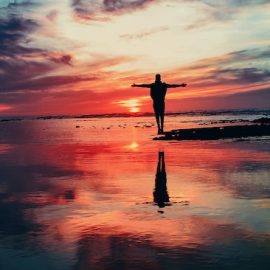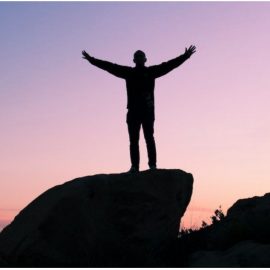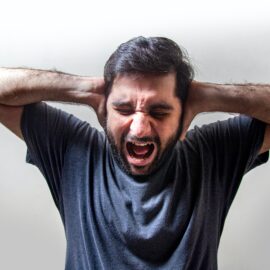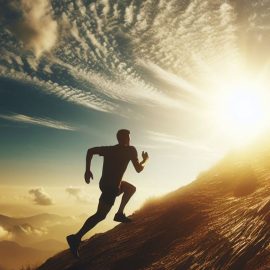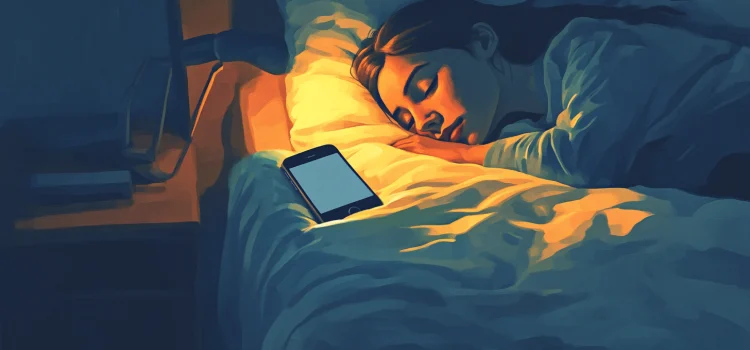
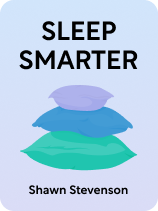
This article is an excerpt from the Shortform book guide to "Sleep Smarter" by Shawn Stevenson. Shortform has the world's best summaries and analyses of books you should be reading.
Like this article? Sign up for a free trial here.
What are the best habits for good sleep? How does your phone disrupt your sleep patterns?
Shawn Stevenson claims that to reap the benefits of quality sleep, you need to align your sleeping habits with your circadian rhythm. Your circadian rhythm acts like a 24-hour timer, telling you when to sleep and when to wake up, coordinating with the cycles of day and night.
Here are the three healthy sleep habits Stevenson advises incorporating into your routine.
Habit #1: Get More Sunlight in the Morning
Stevenson writes that your circadian rhythms are controlled by a collection of nerves in your hypothalamus, the part of the brain responsible for regulating all hormones. One of the main triggers of these nerves is sunlight. To help regulate your sleep cycle, he thus suggests the healthy sleep habit of getting more sunlight—particularly in the morning. When you expose yourself to sunlight in the morning, it signals to your hypothalamus that it’s time to wake up, prompting the release of hormones that make you more alert and trigger important biological processes, such as hunger and thirst.
Morning sunlight exposure also prompts your body to produce hormones needed for a normal sleep cycle. Stevenson details three of these hormones: serotonin, melatonin, and cortisol.
Serotonin
Most people know serotonin as the hormone that creates a feeling of security and happiness, but it also plays an important role in regulating sleep cycles—in part by aiding in the production of melatonin (discussed below). Our brains produce serotonin when sunlight hits our eyes, and our skin also produces it when exposed to sunlight.
Melatonin
Melatonin prepares your body for sleep at the cellular level, thus improving the quality of your sleep. Your melatonin production is highly correlated to your exposure to light: Your body produces it as it gets darker in the evening, and getting more light during the day—and less at night—helps to ensure this process happens effectively.
Cortisol
Cortisol is the hormone that most directly influences your circadian rhythms. Your body produces a surge of it in the morning, waking you up and helping you stay alert and focused throughout the day. Then, your cortisol levels fall during the day, so by the time the evening arrives, you’re ready for sleep.
If your cortisol levels are too high or too low at the wrong time, you may be tired when you’re supposed to be awake or alert when you’re supposed to be sleeping. Getting the right amount of light—particularly sunlight—during the day ensures that your cortisol levels rise and fall when they’re supposed to.
Habit #2: Reduce Screen Time at Night
Stevenson warns against using technology, especially screens, close to bedtime. He explains that artificial light—specifically blue light emanating from devices like smartphones, tablets, computers, and even televisions—can interfere with your body’s circadian rhythms.
This is because blue light sends signals to your brain that it’s still daylight, triggering the production of cortisol and delaying the production of melatonin. You become awake and alert when you should be feeling sleepy. If you consistently use technology before bed, you can chronically disrupt your circadian rhythms, leading to more serious health issues over time.
Stevenson recommends halting the use of your devices at least 90 minutes before heading off to bed and replacing that screen time with calming activities such as reading a book (a physical one—not an e-book), taking a warm bath, or practicing gentle yoga stretches. These activities help signal to your body clock that it’s time to wind down and prepare for upcoming rest hours.
(Shortform note: Stevenson recommends going screen-free at least 90 minutes before bed, but the National Sleep Foundation states that even an hour before bed could be beneficial. And while Stevenson identifies blue light as the primary factor linking screen time to restlessness, it’s important to note that this effect can be mitigated by blocking the blue light, either through a filter to put over your screen or a pair of amber-tinted glasses. Studies have shown that reducing blue light exposure in this way improves sleep in insomniacs. However, light blockers may not be enough. Many popular screen activities such as social media or video games may inhibit your sleep anyway by inducing higher levels of excitation and anxiety.)
Habit #3: Get the Timing of Your Sleep Right
According to Stevenson, the timing of your sleep affects the quality of it. The best time to sleep—the optimal time for your body to make repairs and the time window in which your body is best able to produce the right hormones—is from 10:00 PM to 2:00 AM. During these hours, your body produces the most melatonin and human growth hormone (which helps your body stay youthful). If your sleep schedule isn’t aligned with the 10:00 PM to 2:00 AM window, you may feel unrefreshed and tired even if you got a full eight hours of sleep.
The process looks like this: Around 10:00 PM (a few hours after sunset), your body gets a natural boost of melatonin. This cues an increase in your internal metabolic energy, which is used for the repair processes we discussed earlier, including the production of antioxidants that protect your DNA.
This only works, however, if you’re asleep—if you’re still awake around 10:00 PM, you’ll feel a burst of energy, even if you were just tired. Instead of being used to rejuvenate your body while you rest, this energy goes toward waking activities like scrolling through your phone. You’ll probably have a harder time falling asleep when you get around to it, and you might wake up without feeling rested.
(Shortform note: The 10:00 PM to 2:00 AM window might not work for everyone. Some researchers assert that your best times for sleeping may be influenced by your chronotype, or your body’s natural preferences for times to be asleep or awake. These preferences are widely distributed throughout society, appearing to follow a natural bell-curve distribution. Researchers have also found evidence that your chronotype may be linked to your genetics. One theory is that evolution selected for a distribution of sleep preferences to share responsibilities for keeping a lookout. If some wake up before others, and others stay up later than everyone else, that creates a wider window of time when someone is awake in the community should a crisis occur.)

———End of Preview———
Like what you just read? Read the rest of the world's best book summary and analysis of Shawn Stevenson's "Sleep Smarter" at Shortform.
Here's what you'll find in our full Sleep Smarter summary:
- How sleep affects your body, mind, and overall quality of life
- Practical suggestions for achieving a good night’s sleep
- The unexpected benefits of eating sweet potatoes


